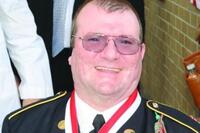My fingers drummed nervously on the couch cushion as I waited for our first session to begin. This was the third counselor I'd spoken with between moves over a period of four years. Up to that point, I'd made little progress in my desperate attempts to address crippling panic attacks and anxiety symptoms I'd come to experience on a near-daily basis since my husband joined the military.
I wasn't feeling too optimistic about starting all over again at a new duty station, but I'd decided to give it one last shot before I resigned myself to living in a constant state of worry for the rest of my life.
I fought back waves of deja vu as I explained my situation to yet another mental health care professional. When I finished, the counselor looked at me for a moment in silence. I held my breath, wondering what she was thinking.
Finally, she spoke.
"It's so difficult, isn't it? Moving over and over again. Having to start fresh in another place. Not knowing where you're going next. Being so far from extended family. My husband was in the military for more than 20 years."
Suddenly, a wave of relief flooded through me, and muscles in my shoulders I didn't realize I'd been clenching relaxed.
She understands me.
I'd been face to face with counselors plenty of times before, but this was the first moment I remember feeling truly seen.
A distinct culture
According to Bret A. Moore, "one group that has received little attention in psychological literature with regard to issues of culture and value as related to practice is the military." The author of Treating PTSD in Military Personnel goes on to say that cultures are identified by distinctive languages, dress customs, rituals, beliefs, manner systems and standards of behavior. By this definition, the military certainly functions within its own culture.
To go a step further, sub-cultures exist between and within branches, as well. The Army, for example, is its own smaller culture within the broader military community. Service members and their families, then, need more mental health care providers who understand what makes military culture so unique.
Am I saying every counselor who works with military families should be required to have the first-hand experience of military life? Absolutely not. However, I do believe civilian mental health care providers must make it a priority to dive deep to gain a genuine understanding of the unique language, distinctive rank system, precious beliefs, cherished values and grueling struggles that are an inherent part of the military community in order to successfully treat veterans, service members and their dependents.
But are our struggles truly unique?
Blaine Everson and Charles R. Figley point out in Families Under Fire, "while it is evident ... 'that large segments of our society deal with one or more of [the] concerns and stresses ... there may be no other major group that confronts so many or all of them' at any given time." The sheer amount of stressors military families must juggle is what separates this complicated lifestyle from the rest.
Counselors must be able to understand what happens to relationships when spouses, parents and children are called to be separated from one another for extended periods of time, over and over again. They must be able to comprehend the physical, mental and emotional demands that come along with frequent moves. They must be able to recognize the silent suffering of service members returning from war, and the challenges their loved ones face when caring for them back home.
I had finally found a provider who could offer me just that.
The difference a military-affiliated professional makes
Working with a mental health care professional who understood my struggles within the context of military life instead of trying to force my unique experiences into a box within a broader worldview made all the difference for me. While I still struggle with anxiety (I probably always will), I learned life-changing, practical coping techniques specific to my role as a military spouse. For example, drawing upon her own experiences of military life, my counselor taught me how to practice relaxation techniques and focus on the aspects of my life that I could control rather than allowing my fears and uncertainties to spiral out of control.
If you are a veteran or service member exploring which career path to take after the military--or maybe you're a military spouse looking for a way to give back to the community--consider pursuing a mental health care degree. The tough experiences you've lived through could help change someone else's life.
Military life is often isolating and alienating; having a mental health care professional on your side who truly understands makes all the difference.
We need you.
Keep Up with the Ins and Outs of Military Life
For the latest military news and tips on military family benefits and more, subscribe to Military.com and have the information you need delivered directly to your inbox.




























